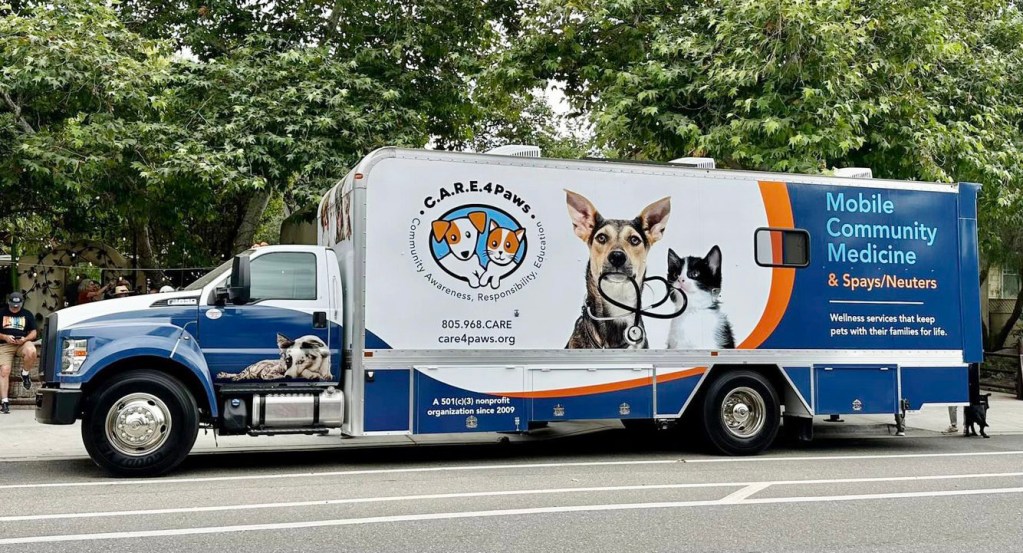On March 23, the beloved nonprofit CARE4Paws hosted an event at La Lieff Winery to share with supporters its game-changing mobile clinic, which it launched last August after a capital campaign raised $330,000 for the unit.
The 65 supporters enjoyed a reception with wine and appetizers and got to tour the new 37-foot clinic, which sports a double surgery suite, a separate area for dental care and other medical treatments, and kennel space. With the immense demand for its services, CARE4Paws continues to use its two much smaller and older clinics as well, enabling them to do 30 surgeries on a typical day, mostly spay and neuter procedures, along with administering vaccines and other medical care.
The mobile clinic is CARE4Paws’ largest program, operating throughout the County, with a consistent appearance in Santa Barbara, Santa Maria, Lompoc, and Grover Beach and frequent service in other locations, including parts of S.L.O. County. The nonprofit’s aim is to ensure that neither cost nor transportation are barriers to pets receiving care. The clinics are staffed by paid veterinarians and technicians and a volunteer team.
During the program, Executive Director Isabelle Gullö explained that CARE4Paws’ mission is to prevent pet homelessness by providing spay and neuter procedures and by providing a safety net for pet families in need. “We are bad at saying no,” she mused, in regard to the range of services they provide, always wanting to find a solution so people can keep pets in their homes.
In an interview, Gullö related how in the past few years, pet owners have been faced with general economic strain and higher veterinary fees, causing an increase in the number of pet owners unable to afford vet care.
Cost isn’t the only issue driving an increase in demand for its services. There is a shortage of veterinarians and vet technicians in the county, which has led to demand from pet owners who can afford vet care, but can’t get timely appointments. CARE4Paws’ priority, Gullö related, remains serving low-income pet families, but the nonprofit tries to assist as many pets in need of urgent care as it can, regardless of income level.
Every day, CARE4Paws receives multiple requests for critical care. When it is unable to meet a pet’s needs because of geographic, time, or scope of service factors, it funds care at its partner vet clinics and emergency care facilities that provide discounted rates. A special CARE4Paws’ donor fund, the Albus Fund, enables this, but demand is rising and funds are limited.
The assistance CARE4Paws provides significantly helps local shelters inundated with animals. “As many families struggle to keep their households afloat, a vet bill or other pet-care costs can be the reason a pet ends up relinquished to a shelter,” Gullö shared. “CARE4Paws intervenes in this crisis by providing safety nets that keep pets in their homes and with the people who love them.”
CARE4Paws is also a critical resource for the homeless population. Many unsheltered individuals refuse even temporary housing if they cannot bring their companion animals with them, Gullö related. Fortunately, two new shelters, Hope Village in Santa Maria and La Posada in Santa Barbara, will allow pets, and CARE4Paws has entered into a partnership agreement to provide free veterinary services and grooming services to residents. In addition, for dog owners, CARE4Paws will offer animal behavior assessments and dog training as well as training sessions for staff and residents on how to interact with pets.
Also, BridgeHouse Emergency Shelter in Lompoc, which allows registered emotional support dogs and service dogs, is partnering with CARE4Paws to provide training for resident owners and other residents. According to Director of Homeless Services Brian Halterman, this hopefully opens the door to allowing other dogs in the future. In reflecting on these opportunities for homeless individuals to attain shelter with their pet, Gullö remarked, “We are excited about this beautiful shift in our community.”
Every Thursday, CARE4Paws continues its distribution of pet food and supplies to homeless pet owners in Alameda Park and hosts special events to serve homeless pet owners.
Last year, CARE4Paws’ mobile clinics provided care to 17,500 dogs and cats. It performed 2,700 spay/neuter procedures, a range of other medical care, vaccines, microchips and more. CARE4Paws also distributes pet food to low-income and homeless individuals year-round. Since the start of the pandemic, it has provided more than three million pet meals. The nonprofit is incredibly efficient, according to Board Chair (and CPA) Chris Harris, operating leanly with no brick-and-mortar facilities. About 85 percent of its $2 million budget goes to clinic operations.
The event launched CARE4Paws planned giving program, the Pawsitive Legacy Club. Major donor Lee Heller shared that legacy gifts are important in helping give nonprofits the certainty that they can continue into the future. She related how shelters outside our county are killing hundreds of healthy animals, but in Santa Barbara, CARE4Paws is preventing this through its spay and neuter services and through the assistance it provides to help people keep their pets.
CARE4Paws’ annual fundraiser, Happy Tails, will be held on May 18 at the Music Academy.
CARE4Paws continues to rely on the community to fund the critical services it provides. It also relies on volunteers and especially needs foster homes for its Safe Haven Domestic Violence Assistance Program, which arranges for immediate, anonymous foster care for pets of domestic violence victims. For more info or to make an online donation, go to http://care4paws.org.

